Modern Slavery: Concepts, Framework, and Sri Lankan Law
VerifiedAdded on 2023/04/07
|13
|3398
|482
Report
AI Summary
This report provides a comprehensive analysis of modern slavery in Sri Lanka, focusing on its concepts, the relevant legal framework, and practical implications. It begins with an introduction to modern slavery, defining key terms such as forced labour, human trafficking, and coercion, and highlighting its prevalence in Sri Lanka. The report then examines the Sri Lankan labour law framework, including relevant legislation and constitutional provisions designed to protect workers' rights. A critical analysis of loopholes within the legal framework is presented, identifying areas where unscrupulous recruiters and employers exploit vulnerable workers. The report assesses the existing status of labour inspection and the monitoring of labour brokers and recruiters, evaluating their effectiveness in preventing exploitation. The discussion covers topics like bonded labour, the exploitation of migrant workers, and the challenges of enforcing labour standards. The report concludes by emphasizing the need for stronger legal protections, improved enforcement mechanisms, and increased awareness to combat modern slavery in Sri Lanka, with references to international legal instruments and the role of various stakeholders in addressing this complex issue.
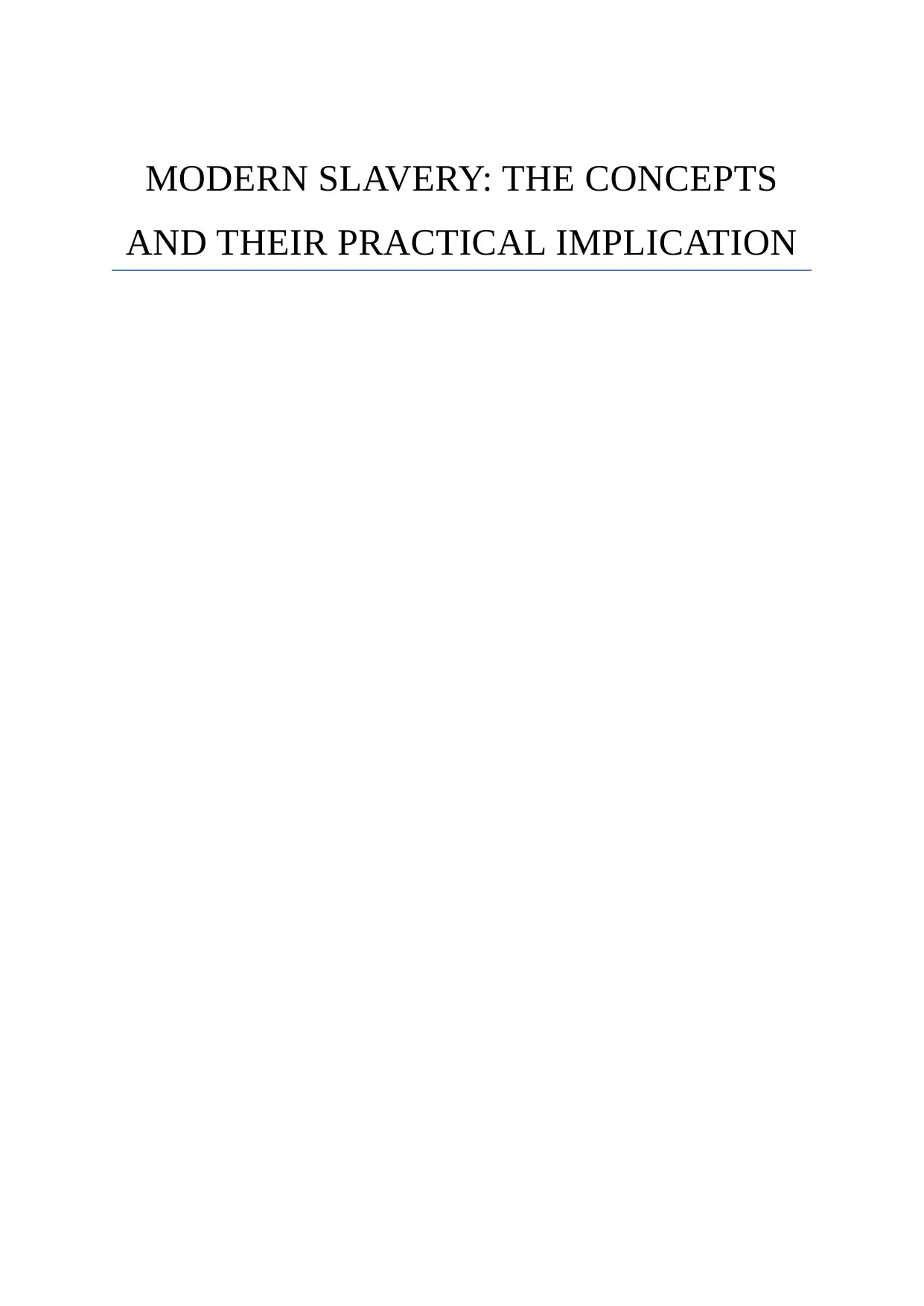
MODERN SLAVERY: THE CONCEPTS
AND THEIR PRACTICAL IMPLICATION
AND THEIR PRACTICAL IMPLICATION
Paraphrase This Document
Need a fresh take? Get an instant paraphrase of this document with our AI Paraphraser
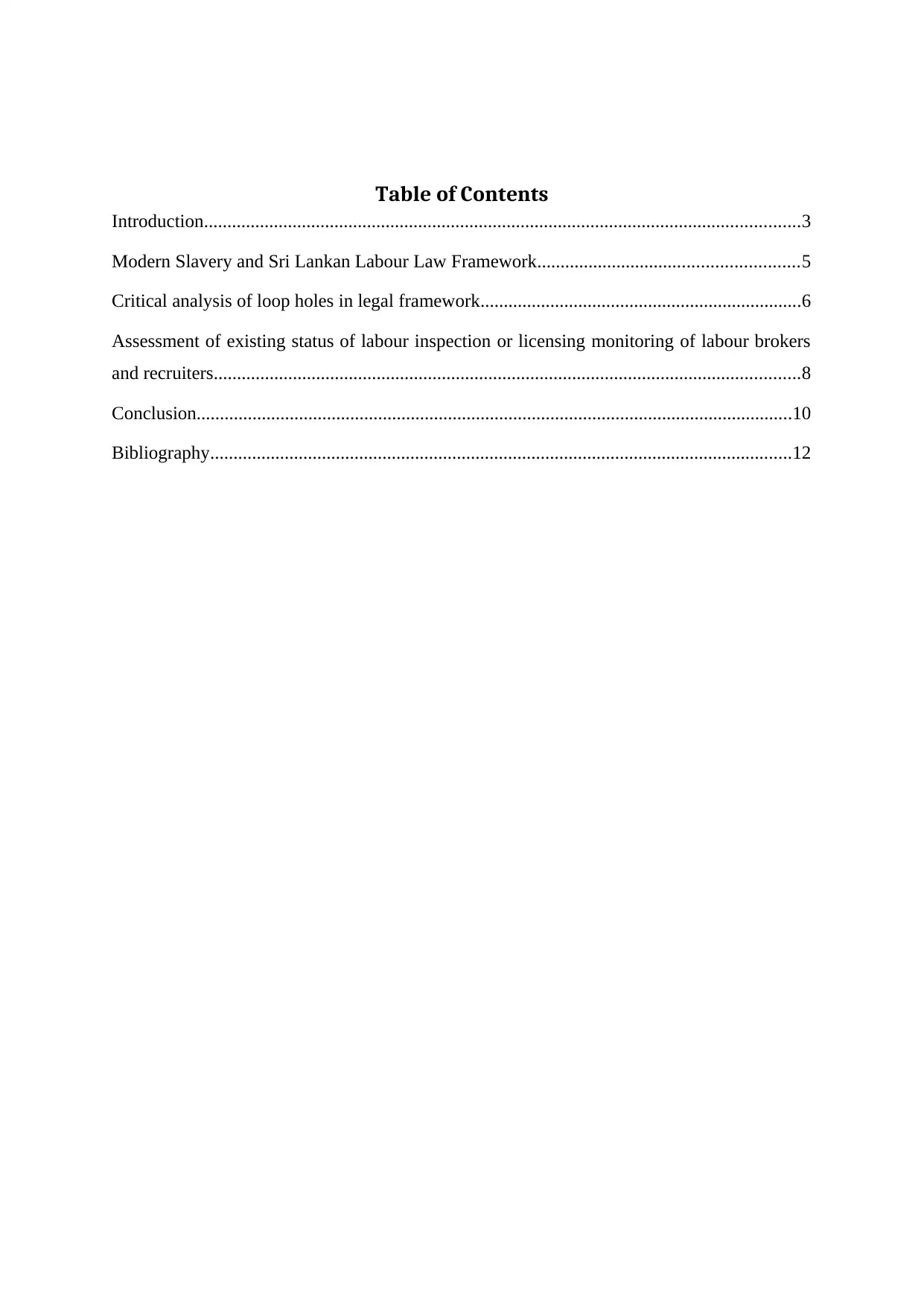
Table of Contents
Introduction................................................................................................................................3
Modern Slavery and Sri Lankan Labour Law Framework........................................................5
Critical analysis of loop holes in legal framework.....................................................................6
Assessment of existing status of labour inspection or licensing monitoring of labour brokers
and recruiters..............................................................................................................................8
Conclusion................................................................................................................................10
Bibliography.............................................................................................................................12
Introduction................................................................................................................................3
Modern Slavery and Sri Lankan Labour Law Framework........................................................5
Critical analysis of loop holes in legal framework.....................................................................6
Assessment of existing status of labour inspection or licensing monitoring of labour brokers
and recruiters..............................................................................................................................8
Conclusion................................................................................................................................10
Bibliography.............................................................................................................................12
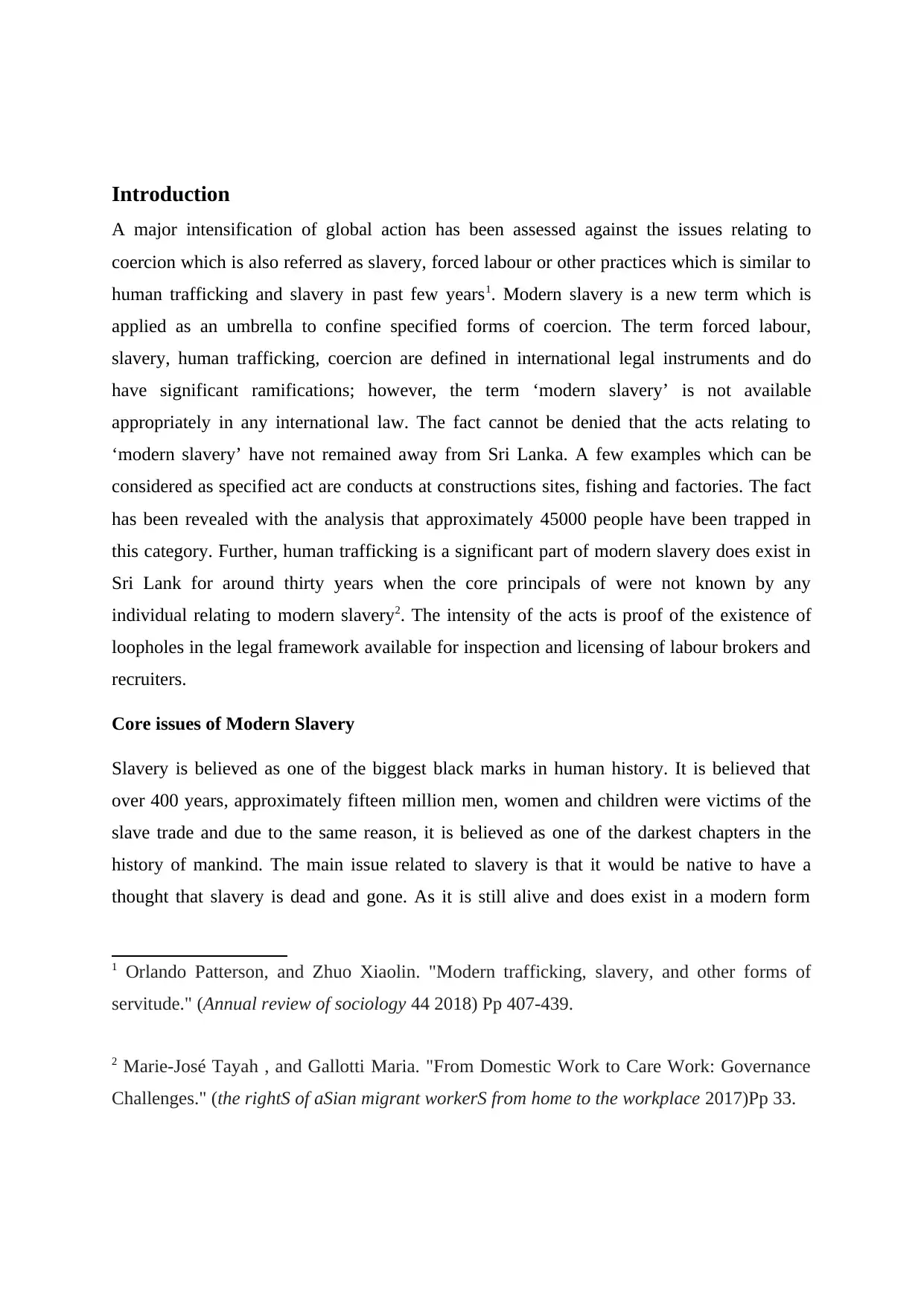
Introduction
A major intensification of global action has been assessed against the issues relating to
coercion which is also referred as slavery, forced labour or other practices which is similar to
human trafficking and slavery in past few years1. Modern slavery is a new term which is
applied as an umbrella to confine specified forms of coercion. The term forced labour,
slavery, human trafficking, coercion are defined in international legal instruments and do
have significant ramifications; however, the term ‘modern slavery’ is not available
appropriately in any international law. The fact cannot be denied that the acts relating to
‘modern slavery’ have not remained away from Sri Lanka. A few examples which can be
considered as specified act are conducts at constructions sites, fishing and factories. The fact
has been revealed with the analysis that approximately 45000 people have been trapped in
this category. Further, human trafficking is a significant part of modern slavery does exist in
Sri Lank for around thirty years when the core principals of were not known by any
individual relating to modern slavery2. The intensity of the acts is proof of the existence of
loopholes in the legal framework available for inspection and licensing of labour brokers and
recruiters.
Core issues of Modern Slavery
Slavery is believed as one of the biggest black marks in human history. It is believed that
over 400 years, approximately fifteen million men, women and children were victims of the
slave trade and due to the same reason, it is believed as one of the darkest chapters in the
history of mankind. The main issue related to slavery is that it would be native to have a
thought that slavery is dead and gone. As it is still alive and does exist in a modern form
1 Orlando Patterson, and Zhuo Xiaolin. "Modern trafficking, slavery, and other forms of
servitude." (Annual review of sociology 44 2018) Pp 407-439.
2 Marie-José Tayah , and Gallotti Maria. "From Domestic Work to Care Work: Governance
Challenges." (the rightS of aSian migrant workerS from home to the workplace 2017)Pp 33.
A major intensification of global action has been assessed against the issues relating to
coercion which is also referred as slavery, forced labour or other practices which is similar to
human trafficking and slavery in past few years1. Modern slavery is a new term which is
applied as an umbrella to confine specified forms of coercion. The term forced labour,
slavery, human trafficking, coercion are defined in international legal instruments and do
have significant ramifications; however, the term ‘modern slavery’ is not available
appropriately in any international law. The fact cannot be denied that the acts relating to
‘modern slavery’ have not remained away from Sri Lanka. A few examples which can be
considered as specified act are conducts at constructions sites, fishing and factories. The fact
has been revealed with the analysis that approximately 45000 people have been trapped in
this category. Further, human trafficking is a significant part of modern slavery does exist in
Sri Lank for around thirty years when the core principals of were not known by any
individual relating to modern slavery2. The intensity of the acts is proof of the existence of
loopholes in the legal framework available for inspection and licensing of labour brokers and
recruiters.
Core issues of Modern Slavery
Slavery is believed as one of the biggest black marks in human history. It is believed that
over 400 years, approximately fifteen million men, women and children were victims of the
slave trade and due to the same reason, it is believed as one of the darkest chapters in the
history of mankind. The main issue related to slavery is that it would be native to have a
thought that slavery is dead and gone. As it is still alive and does exist in a modern form
1 Orlando Patterson, and Zhuo Xiaolin. "Modern trafficking, slavery, and other forms of
servitude." (Annual review of sociology 44 2018) Pp 407-439.
2 Marie-José Tayah , and Gallotti Maria. "From Domestic Work to Care Work: Governance
Challenges." (the rightS of aSian migrant workerS from home to the workplace 2017)Pp 33.
⊘ This is a preview!⊘
Do you want full access?
Subscribe today to unlock all pages.

Trusted by 1+ million students worldwide
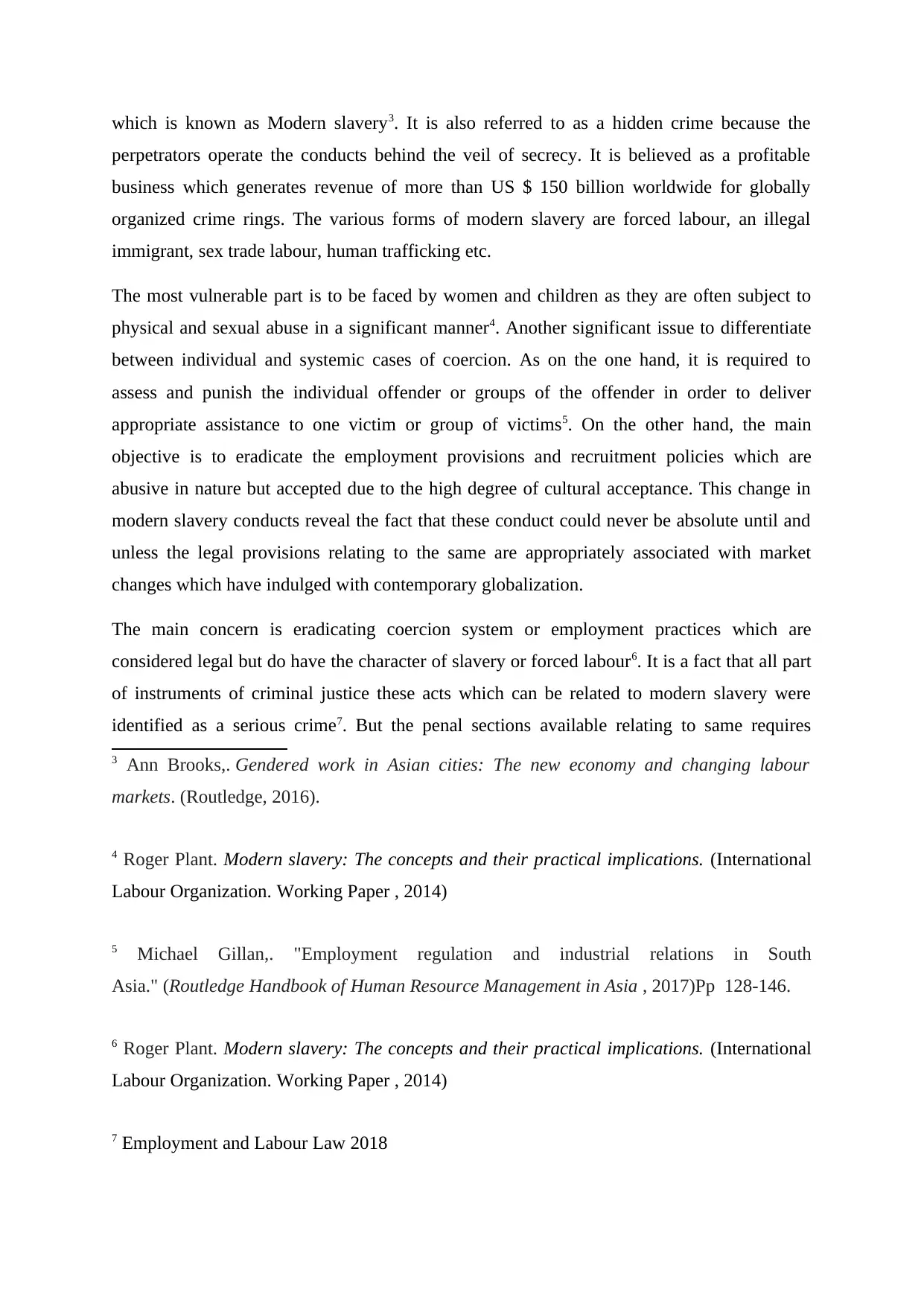
which is known as Modern slavery3. It is also referred to as a hidden crime because the
perpetrators operate the conducts behind the veil of secrecy. It is believed as a profitable
business which generates revenue of more than US $ 150 billion worldwide for globally
organized crime rings. The various forms of modern slavery are forced labour, an illegal
immigrant, sex trade labour, human trafficking etc.
The most vulnerable part is to be faced by women and children as they are often subject to
physical and sexual abuse in a significant manner4. Another significant issue to differentiate
between individual and systemic cases of coercion. As on the one hand, it is required to
assess and punish the individual offender or groups of the offender in order to deliver
appropriate assistance to one victim or group of victims5. On the other hand, the main
objective is to eradicate the employment provisions and recruitment policies which are
abusive in nature but accepted due to the high degree of cultural acceptance. This change in
modern slavery conducts reveal the fact that these conduct could never be absolute until and
unless the legal provisions relating to the same are appropriately associated with market
changes which have indulged with contemporary globalization.
The main concern is eradicating coercion system or employment practices which are
considered legal but do have the character of slavery or forced labour6. It is a fact that all part
of instruments of criminal justice these acts which can be related to modern slavery were
identified as a serious crime7. But the penal sections available relating to same requires
3 Ann Brooks,. Gendered work in Asian cities: The new economy and changing labour
markets. (Routledge, 2016).
4 Roger Plant. Modern slavery: The concepts and their practical implications. (International
Labour Organization. Working Paper , 2014)
5 Michael Gillan,. "Employment regulation and industrial relations in South
Asia." (Routledge Handbook of Human Resource Management in Asia , 2017)Pp 128-146.
6 Roger Plant. Modern slavery: The concepts and their practical implications. (International
Labour Organization. Working Paper , 2014)
7 Employment and Labour Law 2018
perpetrators operate the conducts behind the veil of secrecy. It is believed as a profitable
business which generates revenue of more than US $ 150 billion worldwide for globally
organized crime rings. The various forms of modern slavery are forced labour, an illegal
immigrant, sex trade labour, human trafficking etc.
The most vulnerable part is to be faced by women and children as they are often subject to
physical and sexual abuse in a significant manner4. Another significant issue to differentiate
between individual and systemic cases of coercion. As on the one hand, it is required to
assess and punish the individual offender or groups of the offender in order to deliver
appropriate assistance to one victim or group of victims5. On the other hand, the main
objective is to eradicate the employment provisions and recruitment policies which are
abusive in nature but accepted due to the high degree of cultural acceptance. This change in
modern slavery conducts reveal the fact that these conduct could never be absolute until and
unless the legal provisions relating to the same are appropriately associated with market
changes which have indulged with contemporary globalization.
The main concern is eradicating coercion system or employment practices which are
considered legal but do have the character of slavery or forced labour6. It is a fact that all part
of instruments of criminal justice these acts which can be related to modern slavery were
identified as a serious crime7. But the penal sections available relating to same requires
3 Ann Brooks,. Gendered work in Asian cities: The new economy and changing labour
markets. (Routledge, 2016).
4 Roger Plant. Modern slavery: The concepts and their practical implications. (International
Labour Organization. Working Paper , 2014)
5 Michael Gillan,. "Employment regulation and industrial relations in South
Asia." (Routledge Handbook of Human Resource Management in Asia , 2017)Pp 128-146.
6 Roger Plant. Modern slavery: The concepts and their practical implications. (International
Labour Organization. Working Paper , 2014)
7 Employment and Labour Law 2018
Paraphrase This Document
Need a fresh take? Get an instant paraphrase of this document with our AI Paraphraser
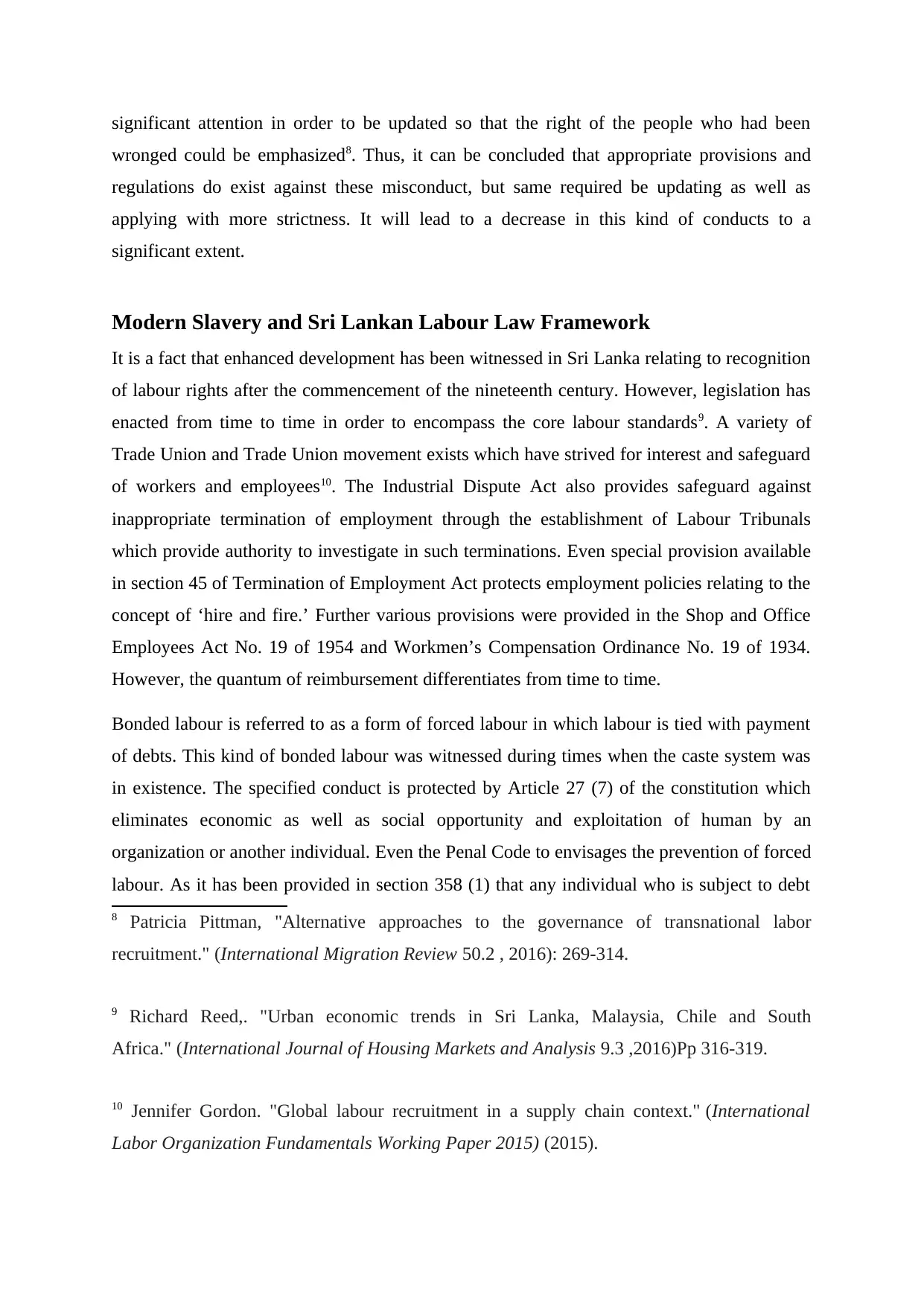
significant attention in order to be updated so that the right of the people who had been
wronged could be emphasized8. Thus, it can be concluded that appropriate provisions and
regulations do exist against these misconduct, but same required be updating as well as
applying with more strictness. It will lead to a decrease in this kind of conducts to a
significant extent.
Modern Slavery and Sri Lankan Labour Law Framework
It is a fact that enhanced development has been witnessed in Sri Lanka relating to recognition
of labour rights after the commencement of the nineteenth century. However, legislation has
enacted from time to time in order to encompass the core labour standards9. A variety of
Trade Union and Trade Union movement exists which have strived for interest and safeguard
of workers and employees10. The Industrial Dispute Act also provides safeguard against
inappropriate termination of employment through the establishment of Labour Tribunals
which provide authority to investigate in such terminations. Even special provision available
in section 45 of Termination of Employment Act protects employment policies relating to the
concept of ‘hire and fire.’ Further various provisions were provided in the Shop and Office
Employees Act No. 19 of 1954 and Workmen’s Compensation Ordinance No. 19 of 1934.
However, the quantum of reimbursement differentiates from time to time.
Bonded labour is referred to as a form of forced labour in which labour is tied with payment
of debts. This kind of bonded labour was witnessed during times when the caste system was
in existence. The specified conduct is protected by Article 27 (7) of the constitution which
eliminates economic as well as social opportunity and exploitation of human by an
organization or another individual. Even the Penal Code to envisages the prevention of forced
labour. As it has been provided in section 358 (1) that any individual who is subject to debt
8 Patricia Pittman, "Alternative approaches to the governance of transnational labor
recruitment." (International Migration Review 50.2 , 2016): 269-314.
9 Richard Reed,. "Urban economic trends in Sri Lanka, Malaysia, Chile and South
Africa." (International Journal of Housing Markets and Analysis 9.3 ,2016)Pp 316-319.
10 Jennifer Gordon. "Global labour recruitment in a supply chain context." (International
Labor Organization Fundamentals Working Paper 2015) (2015).
wronged could be emphasized8. Thus, it can be concluded that appropriate provisions and
regulations do exist against these misconduct, but same required be updating as well as
applying with more strictness. It will lead to a decrease in this kind of conducts to a
significant extent.
Modern Slavery and Sri Lankan Labour Law Framework
It is a fact that enhanced development has been witnessed in Sri Lanka relating to recognition
of labour rights after the commencement of the nineteenth century. However, legislation has
enacted from time to time in order to encompass the core labour standards9. A variety of
Trade Union and Trade Union movement exists which have strived for interest and safeguard
of workers and employees10. The Industrial Dispute Act also provides safeguard against
inappropriate termination of employment through the establishment of Labour Tribunals
which provide authority to investigate in such terminations. Even special provision available
in section 45 of Termination of Employment Act protects employment policies relating to the
concept of ‘hire and fire.’ Further various provisions were provided in the Shop and Office
Employees Act No. 19 of 1954 and Workmen’s Compensation Ordinance No. 19 of 1934.
However, the quantum of reimbursement differentiates from time to time.
Bonded labour is referred to as a form of forced labour in which labour is tied with payment
of debts. This kind of bonded labour was witnessed during times when the caste system was
in existence. The specified conduct is protected by Article 27 (7) of the constitution which
eliminates economic as well as social opportunity and exploitation of human by an
organization or another individual. Even the Penal Code to envisages the prevention of forced
labour. As it has been provided in section 358 (1) that any individual who is subject to debt
8 Patricia Pittman, "Alternative approaches to the governance of transnational labor
recruitment." (International Migration Review 50.2 , 2016): 269-314.
9 Richard Reed,. "Urban economic trends in Sri Lanka, Malaysia, Chile and South
Africa." (International Journal of Housing Markets and Analysis 9.3 ,2016)Pp 316-319.
10 Jennifer Gordon. "Global labour recruitment in a supply chain context." (International
Labor Organization Fundamentals Working Paper 2015) (2015).
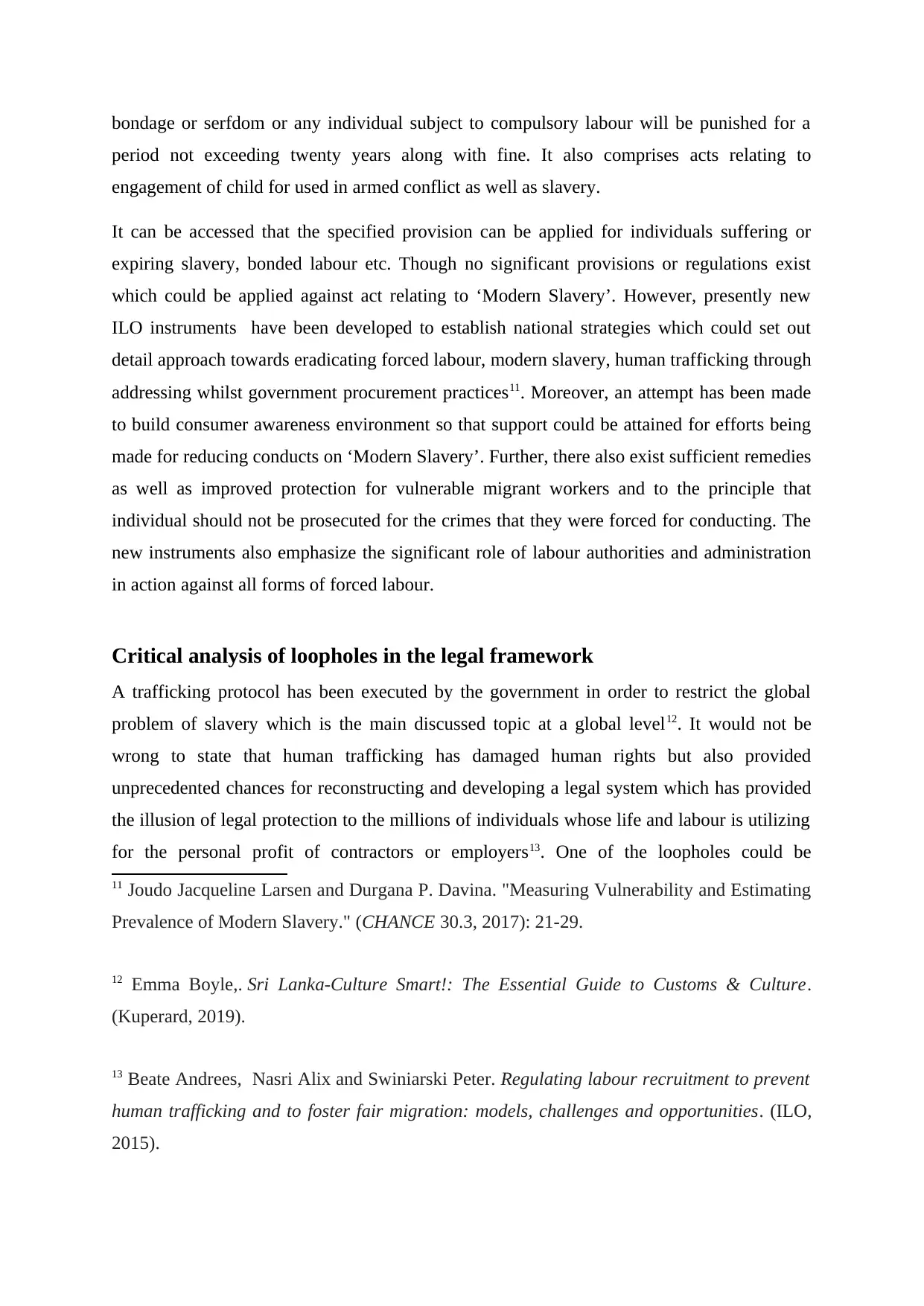
bondage or serfdom or any individual subject to compulsory labour will be punished for a
period not exceeding twenty years along with fine. It also comprises acts relating to
engagement of child for used in armed conflict as well as slavery.
It can be accessed that the specified provision can be applied for individuals suffering or
expiring slavery, bonded labour etc. Though no significant provisions or regulations exist
which could be applied against act relating to ‘Modern Slavery’. However, presently new
ILO instruments have been developed to establish national strategies which could set out
detail approach towards eradicating forced labour, modern slavery, human trafficking through
addressing whilst government procurement practices11. Moreover, an attempt has been made
to build consumer awareness environment so that support could be attained for efforts being
made for reducing conducts on ‘Modern Slavery’. Further, there also exist sufficient remedies
as well as improved protection for vulnerable migrant workers and to the principle that
individual should not be prosecuted for the crimes that they were forced for conducting. The
new instruments also emphasize the significant role of labour authorities and administration
in action against all forms of forced labour.
Critical analysis of loopholes in the legal framework
A trafficking protocol has been executed by the government in order to restrict the global
problem of slavery which is the main discussed topic at a global level12. It would not be
wrong to state that human trafficking has damaged human rights but also provided
unprecedented chances for reconstructing and developing a legal system which has provided
the illusion of legal protection to the millions of individuals whose life and labour is utilizing
for the personal profit of contractors or employers13. One of the loopholes could be
11 Joudo Jacqueline Larsen and Durgana P. Davina. "Measuring Vulnerability and Estimating
Prevalence of Modern Slavery." (CHANCE 30.3, 2017): 21-29.
12 Emma Boyle,. Sri Lanka-Culture Smart!: The Essential Guide to Customs & Culture.
(Kuperard, 2019).
13 Beate Andrees, Nasri Alix and Swiniarski Peter. Regulating labour recruitment to prevent
human trafficking and to foster fair migration: models, challenges and opportunities. (ILO,
2015).
period not exceeding twenty years along with fine. It also comprises acts relating to
engagement of child for used in armed conflict as well as slavery.
It can be accessed that the specified provision can be applied for individuals suffering or
expiring slavery, bonded labour etc. Though no significant provisions or regulations exist
which could be applied against act relating to ‘Modern Slavery’. However, presently new
ILO instruments have been developed to establish national strategies which could set out
detail approach towards eradicating forced labour, modern slavery, human trafficking through
addressing whilst government procurement practices11. Moreover, an attempt has been made
to build consumer awareness environment so that support could be attained for efforts being
made for reducing conducts on ‘Modern Slavery’. Further, there also exist sufficient remedies
as well as improved protection for vulnerable migrant workers and to the principle that
individual should not be prosecuted for the crimes that they were forced for conducting. The
new instruments also emphasize the significant role of labour authorities and administration
in action against all forms of forced labour.
Critical analysis of loopholes in the legal framework
A trafficking protocol has been executed by the government in order to restrict the global
problem of slavery which is the main discussed topic at a global level12. It would not be
wrong to state that human trafficking has damaged human rights but also provided
unprecedented chances for reconstructing and developing a legal system which has provided
the illusion of legal protection to the millions of individuals whose life and labour is utilizing
for the personal profit of contractors or employers13. One of the loopholes could be
11 Joudo Jacqueline Larsen and Durgana P. Davina. "Measuring Vulnerability and Estimating
Prevalence of Modern Slavery." (CHANCE 30.3, 2017): 21-29.
12 Emma Boyle,. Sri Lanka-Culture Smart!: The Essential Guide to Customs & Culture.
(Kuperard, 2019).
13 Beate Andrees, Nasri Alix and Swiniarski Peter. Regulating labour recruitment to prevent
human trafficking and to foster fair migration: models, challenges and opportunities. (ILO,
2015).
⊘ This is a preview!⊘
Do you want full access?
Subscribe today to unlock all pages.

Trusted by 1+ million students worldwide
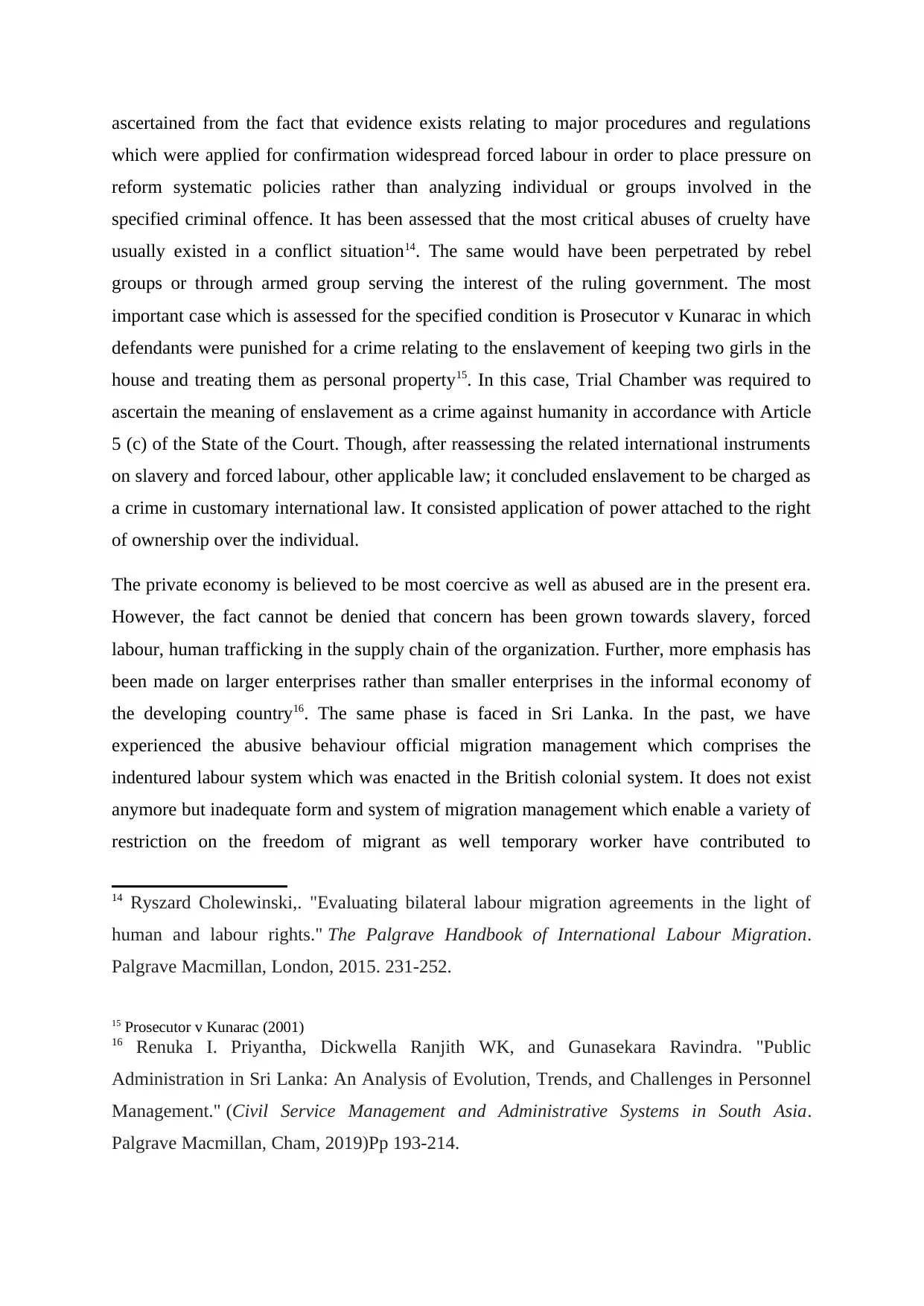
ascertained from the fact that evidence exists relating to major procedures and regulations
which were applied for confirmation widespread forced labour in order to place pressure on
reform systematic policies rather than analyzing individual or groups involved in the
specified criminal offence. It has been assessed that the most critical abuses of cruelty have
usually existed in a conflict situation14. The same would have been perpetrated by rebel
groups or through armed group serving the interest of the ruling government. The most
important case which is assessed for the specified condition is Prosecutor v Kunarac in which
defendants were punished for a crime relating to the enslavement of keeping two girls in the
house and treating them as personal property15. In this case, Trial Chamber was required to
ascertain the meaning of enslavement as a crime against humanity in accordance with Article
5 (c) of the State of the Court. Though, after reassessing the related international instruments
on slavery and forced labour, other applicable law; it concluded enslavement to be charged as
a crime in customary international law. It consisted application of power attached to the right
of ownership over the individual.
The private economy is believed to be most coercive as well as abused are in the present era.
However, the fact cannot be denied that concern has been grown towards slavery, forced
labour, human trafficking in the supply chain of the organization. Further, more emphasis has
been made on larger enterprises rather than smaller enterprises in the informal economy of
the developing country16. The same phase is faced in Sri Lanka. In the past, we have
experienced the abusive behaviour official migration management which comprises the
indentured labour system which was enacted in the British colonial system. It does not exist
anymore but inadequate form and system of migration management which enable a variety of
restriction on the freedom of migrant as well temporary worker have contributed to
14 Ryszard Cholewinski,. "Evaluating bilateral labour migration agreements in the light of
human and labour rights." The Palgrave Handbook of International Labour Migration.
Palgrave Macmillan, London, 2015. 231-252.
15 Prosecutor v Kunarac (2001)
16 Renuka I. Priyantha, Dickwella Ranjith WK, and Gunasekara Ravindra. "Public
Administration in Sri Lanka: An Analysis of Evolution, Trends, and Challenges in Personnel
Management." (Civil Service Management and Administrative Systems in South Asia.
Palgrave Macmillan, Cham, 2019)Pp 193-214.
which were applied for confirmation widespread forced labour in order to place pressure on
reform systematic policies rather than analyzing individual or groups involved in the
specified criminal offence. It has been assessed that the most critical abuses of cruelty have
usually existed in a conflict situation14. The same would have been perpetrated by rebel
groups or through armed group serving the interest of the ruling government. The most
important case which is assessed for the specified condition is Prosecutor v Kunarac in which
defendants were punished for a crime relating to the enslavement of keeping two girls in the
house and treating them as personal property15. In this case, Trial Chamber was required to
ascertain the meaning of enslavement as a crime against humanity in accordance with Article
5 (c) of the State of the Court. Though, after reassessing the related international instruments
on slavery and forced labour, other applicable law; it concluded enslavement to be charged as
a crime in customary international law. It consisted application of power attached to the right
of ownership over the individual.
The private economy is believed to be most coercive as well as abused are in the present era.
However, the fact cannot be denied that concern has been grown towards slavery, forced
labour, human trafficking in the supply chain of the organization. Further, more emphasis has
been made on larger enterprises rather than smaller enterprises in the informal economy of
the developing country16. The same phase is faced in Sri Lanka. In the past, we have
experienced the abusive behaviour official migration management which comprises the
indentured labour system which was enacted in the British colonial system. It does not exist
anymore but inadequate form and system of migration management which enable a variety of
restriction on the freedom of migrant as well temporary worker have contributed to
14 Ryszard Cholewinski,. "Evaluating bilateral labour migration agreements in the light of
human and labour rights." The Palgrave Handbook of International Labour Migration.
Palgrave Macmillan, London, 2015. 231-252.
15 Prosecutor v Kunarac (2001)
16 Renuka I. Priyantha, Dickwella Ranjith WK, and Gunasekara Ravindra. "Public
Administration in Sri Lanka: An Analysis of Evolution, Trends, and Challenges in Personnel
Management." (Civil Service Management and Administrative Systems in South Asia.
Palgrave Macmillan, Cham, 2019)Pp 193-214.
Paraphrase This Document
Need a fresh take? Get an instant paraphrase of this document with our AI Paraphraser
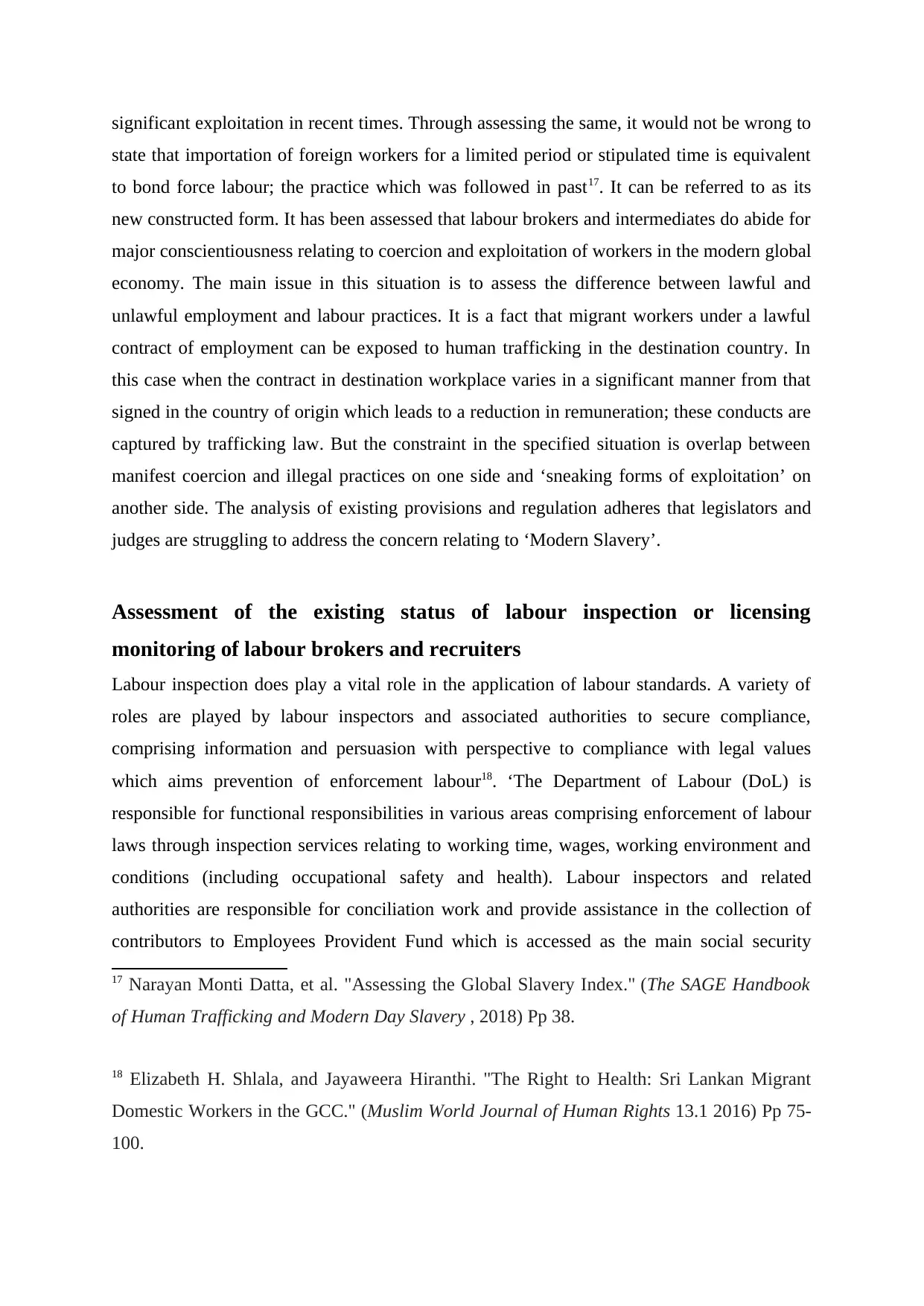
significant exploitation in recent times. Through assessing the same, it would not be wrong to
state that importation of foreign workers for a limited period or stipulated time is equivalent
to bond force labour; the practice which was followed in past17. It can be referred to as its
new constructed form. It has been assessed that labour brokers and intermediates do abide for
major conscientiousness relating to coercion and exploitation of workers in the modern global
economy. The main issue in this situation is to assess the difference between lawful and
unlawful employment and labour practices. It is a fact that migrant workers under a lawful
contract of employment can be exposed to human trafficking in the destination country. In
this case when the contract in destination workplace varies in a significant manner from that
signed in the country of origin which leads to a reduction in remuneration; these conducts are
captured by trafficking law. But the constraint in the specified situation is overlap between
manifest coercion and illegal practices on one side and ‘sneaking forms of exploitation’ on
another side. The analysis of existing provisions and regulation adheres that legislators and
judges are struggling to address the concern relating to ‘Modern Slavery’.
Assessment of the existing status of labour inspection or licensing
monitoring of labour brokers and recruiters
Labour inspection does play a vital role in the application of labour standards. A variety of
roles are played by labour inspectors and associated authorities to secure compliance,
comprising information and persuasion with perspective to compliance with legal values
which aims prevention of enforcement labour18. ‘The Department of Labour (DoL) is
responsible for functional responsibilities in various areas comprising enforcement of labour
laws through inspection services relating to working time, wages, working environment and
conditions (including occupational safety and health). Labour inspectors and related
authorities are responsible for conciliation work and provide assistance in the collection of
contributors to Employees Provident Fund which is accessed as the main social security
17 Narayan Monti Datta, et al. "Assessing the Global Slavery Index." (The SAGE Handbook
of Human Trafficking and Modern Day Slavery , 2018) Pp 38.
18 Elizabeth H. Shlala, and Jayaweera Hiranthi. "The Right to Health: Sri Lankan Migrant
Domestic Workers in the GCC." (Muslim World Journal of Human Rights 13.1 2016) Pp 75-
100.
state that importation of foreign workers for a limited period or stipulated time is equivalent
to bond force labour; the practice which was followed in past17. It can be referred to as its
new constructed form. It has been assessed that labour brokers and intermediates do abide for
major conscientiousness relating to coercion and exploitation of workers in the modern global
economy. The main issue in this situation is to assess the difference between lawful and
unlawful employment and labour practices. It is a fact that migrant workers under a lawful
contract of employment can be exposed to human trafficking in the destination country. In
this case when the contract in destination workplace varies in a significant manner from that
signed in the country of origin which leads to a reduction in remuneration; these conducts are
captured by trafficking law. But the constraint in the specified situation is overlap between
manifest coercion and illegal practices on one side and ‘sneaking forms of exploitation’ on
another side. The analysis of existing provisions and regulation adheres that legislators and
judges are struggling to address the concern relating to ‘Modern Slavery’.
Assessment of the existing status of labour inspection or licensing
monitoring of labour brokers and recruiters
Labour inspection does play a vital role in the application of labour standards. A variety of
roles are played by labour inspectors and associated authorities to secure compliance,
comprising information and persuasion with perspective to compliance with legal values
which aims prevention of enforcement labour18. ‘The Department of Labour (DoL) is
responsible for functional responsibilities in various areas comprising enforcement of labour
laws through inspection services relating to working time, wages, working environment and
conditions (including occupational safety and health). Labour inspectors and related
authorities are responsible for conciliation work and provide assistance in the collection of
contributors to Employees Provident Fund which is accessed as the main social security
17 Narayan Monti Datta, et al. "Assessing the Global Slavery Index." (The SAGE Handbook
of Human Trafficking and Modern Day Slavery , 2018) Pp 38.
18 Elizabeth H. Shlala, and Jayaweera Hiranthi. "The Right to Health: Sri Lankan Migrant
Domestic Workers in the GCC." (Muslim World Journal of Human Rights 13.1 2016) Pp 75-
100.
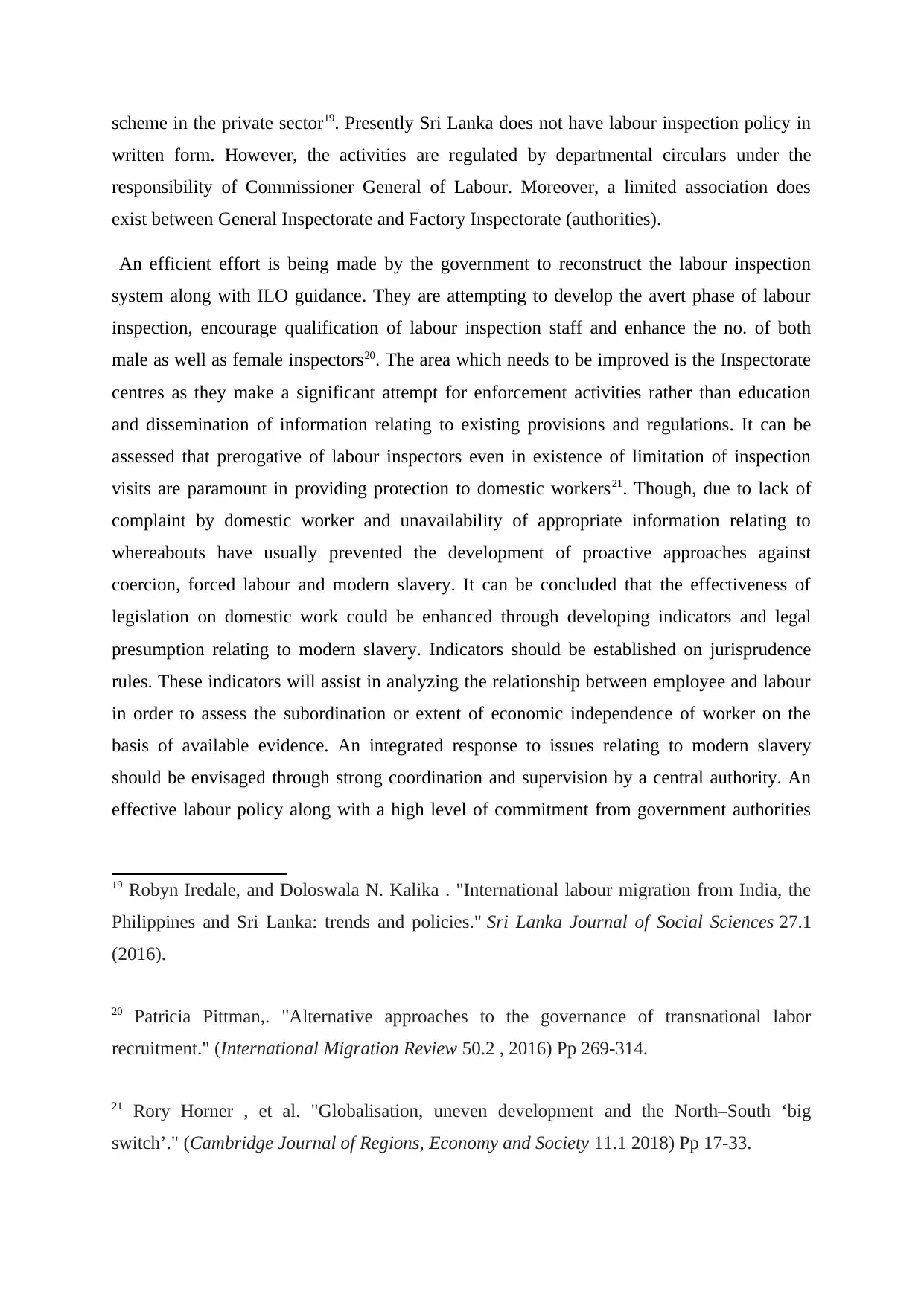
scheme in the private sector19. Presently Sri Lanka does not have labour inspection policy in
written form. However, the activities are regulated by departmental circulars under the
responsibility of Commissioner General of Labour. Moreover, a limited association does
exist between General Inspectorate and Factory Inspectorate (authorities).
An efficient effort is being made by the government to reconstruct the labour inspection
system along with ILO guidance. They are attempting to develop the avert phase of labour
inspection, encourage qualification of labour inspection staff and enhance the no. of both
male as well as female inspectors20. The area which needs to be improved is the Inspectorate
centres as they make a significant attempt for enforcement activities rather than education
and dissemination of information relating to existing provisions and regulations. It can be
assessed that prerogative of labour inspectors even in existence of limitation of inspection
visits are paramount in providing protection to domestic workers21. Though, due to lack of
complaint by domestic worker and unavailability of appropriate information relating to
whereabouts have usually prevented the development of proactive approaches against
coercion, forced labour and modern slavery. It can be concluded that the effectiveness of
legislation on domestic work could be enhanced through developing indicators and legal
presumption relating to modern slavery. Indicators should be established on jurisprudence
rules. These indicators will assist in analyzing the relationship between employee and labour
in order to assess the subordination or extent of economic independence of worker on the
basis of available evidence. An integrated response to issues relating to modern slavery
should be envisaged through strong coordination and supervision by a central authority. An
effective labour policy along with a high level of commitment from government authorities
19 Robyn Iredale, and Doloswala N. Kalika . "International labour migration from India, the
Philippines and Sri Lanka: trends and policies." Sri Lanka Journal of Social Sciences 27.1
(2016).
20 Patricia Pittman,. "Alternative approaches to the governance of transnational labor
recruitment." (International Migration Review 50.2 , 2016) Pp 269-314.
21 Rory Horner , et al. "Globalisation, uneven development and the North–South ‘big
switch’." (Cambridge Journal of Regions, Economy and Society 11.1 2018) Pp 17-33.
written form. However, the activities are regulated by departmental circulars under the
responsibility of Commissioner General of Labour. Moreover, a limited association does
exist between General Inspectorate and Factory Inspectorate (authorities).
An efficient effort is being made by the government to reconstruct the labour inspection
system along with ILO guidance. They are attempting to develop the avert phase of labour
inspection, encourage qualification of labour inspection staff and enhance the no. of both
male as well as female inspectors20. The area which needs to be improved is the Inspectorate
centres as they make a significant attempt for enforcement activities rather than education
and dissemination of information relating to existing provisions and regulations. It can be
assessed that prerogative of labour inspectors even in existence of limitation of inspection
visits are paramount in providing protection to domestic workers21. Though, due to lack of
complaint by domestic worker and unavailability of appropriate information relating to
whereabouts have usually prevented the development of proactive approaches against
coercion, forced labour and modern slavery. It can be concluded that the effectiveness of
legislation on domestic work could be enhanced through developing indicators and legal
presumption relating to modern slavery. Indicators should be established on jurisprudence
rules. These indicators will assist in analyzing the relationship between employee and labour
in order to assess the subordination or extent of economic independence of worker on the
basis of available evidence. An integrated response to issues relating to modern slavery
should be envisaged through strong coordination and supervision by a central authority. An
effective labour policy along with a high level of commitment from government authorities
19 Robyn Iredale, and Doloswala N. Kalika . "International labour migration from India, the
Philippines and Sri Lanka: trends and policies." Sri Lanka Journal of Social Sciences 27.1
(2016).
20 Patricia Pittman,. "Alternative approaches to the governance of transnational labor
recruitment." (International Migration Review 50.2 , 2016) Pp 269-314.
21 Rory Horner , et al. "Globalisation, uneven development and the North–South ‘big
switch’." (Cambridge Journal of Regions, Economy and Society 11.1 2018) Pp 17-33.
⊘ This is a preview!⊘
Do you want full access?
Subscribe today to unlock all pages.

Trusted by 1+ million students worldwide
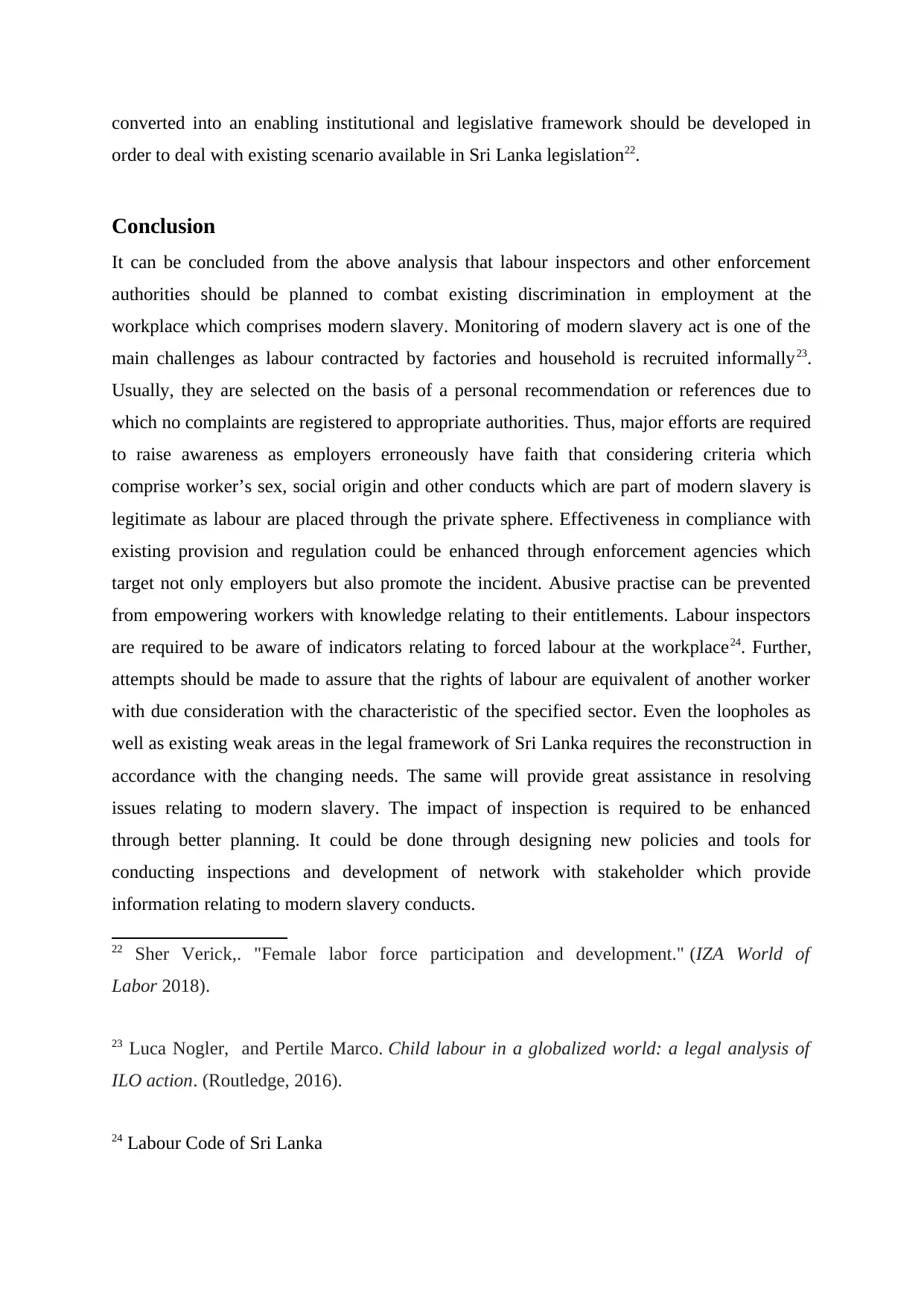
converted into an enabling institutional and legislative framework should be developed in
order to deal with existing scenario available in Sri Lanka legislation22.
Conclusion
It can be concluded from the above analysis that labour inspectors and other enforcement
authorities should be planned to combat existing discrimination in employment at the
workplace which comprises modern slavery. Monitoring of modern slavery act is one of the
main challenges as labour contracted by factories and household is recruited informally23.
Usually, they are selected on the basis of a personal recommendation or references due to
which no complaints are registered to appropriate authorities. Thus, major efforts are required
to raise awareness as employers erroneously have faith that considering criteria which
comprise worker’s sex, social origin and other conducts which are part of modern slavery is
legitimate as labour are placed through the private sphere. Effectiveness in compliance with
existing provision and regulation could be enhanced through enforcement agencies which
target not only employers but also promote the incident. Abusive practise can be prevented
from empowering workers with knowledge relating to their entitlements. Labour inspectors
are required to be aware of indicators relating to forced labour at the workplace24. Further,
attempts should be made to assure that the rights of labour are equivalent of another worker
with due consideration with the characteristic of the specified sector. Even the loopholes as
well as existing weak areas in the legal framework of Sri Lanka requires the reconstruction in
accordance with the changing needs. The same will provide great assistance in resolving
issues relating to modern slavery. The impact of inspection is required to be enhanced
through better planning. It could be done through designing new policies and tools for
conducting inspections and development of network with stakeholder which provide
information relating to modern slavery conducts.
22 Sher Verick,. "Female labor force participation and development." (IZA World of
Labor 2018).
23 Luca Nogler, and Pertile Marco. Child labour in a globalized world: a legal analysis of
ILO action. (Routledge, 2016).
24 Labour Code of Sri Lanka
order to deal with existing scenario available in Sri Lanka legislation22.
Conclusion
It can be concluded from the above analysis that labour inspectors and other enforcement
authorities should be planned to combat existing discrimination in employment at the
workplace which comprises modern slavery. Monitoring of modern slavery act is one of the
main challenges as labour contracted by factories and household is recruited informally23.
Usually, they are selected on the basis of a personal recommendation or references due to
which no complaints are registered to appropriate authorities. Thus, major efforts are required
to raise awareness as employers erroneously have faith that considering criteria which
comprise worker’s sex, social origin and other conducts which are part of modern slavery is
legitimate as labour are placed through the private sphere. Effectiveness in compliance with
existing provision and regulation could be enhanced through enforcement agencies which
target not only employers but also promote the incident. Abusive practise can be prevented
from empowering workers with knowledge relating to their entitlements. Labour inspectors
are required to be aware of indicators relating to forced labour at the workplace24. Further,
attempts should be made to assure that the rights of labour are equivalent of another worker
with due consideration with the characteristic of the specified sector. Even the loopholes as
well as existing weak areas in the legal framework of Sri Lanka requires the reconstruction in
accordance with the changing needs. The same will provide great assistance in resolving
issues relating to modern slavery. The impact of inspection is required to be enhanced
through better planning. It could be done through designing new policies and tools for
conducting inspections and development of network with stakeholder which provide
information relating to modern slavery conducts.
22 Sher Verick,. "Female labor force participation and development." (IZA World of
Labor 2018).
23 Luca Nogler, and Pertile Marco. Child labour in a globalized world: a legal analysis of
ILO action. (Routledge, 2016).
24 Labour Code of Sri Lanka
Paraphrase This Document
Need a fresh take? Get an instant paraphrase of this document with our AI Paraphraser

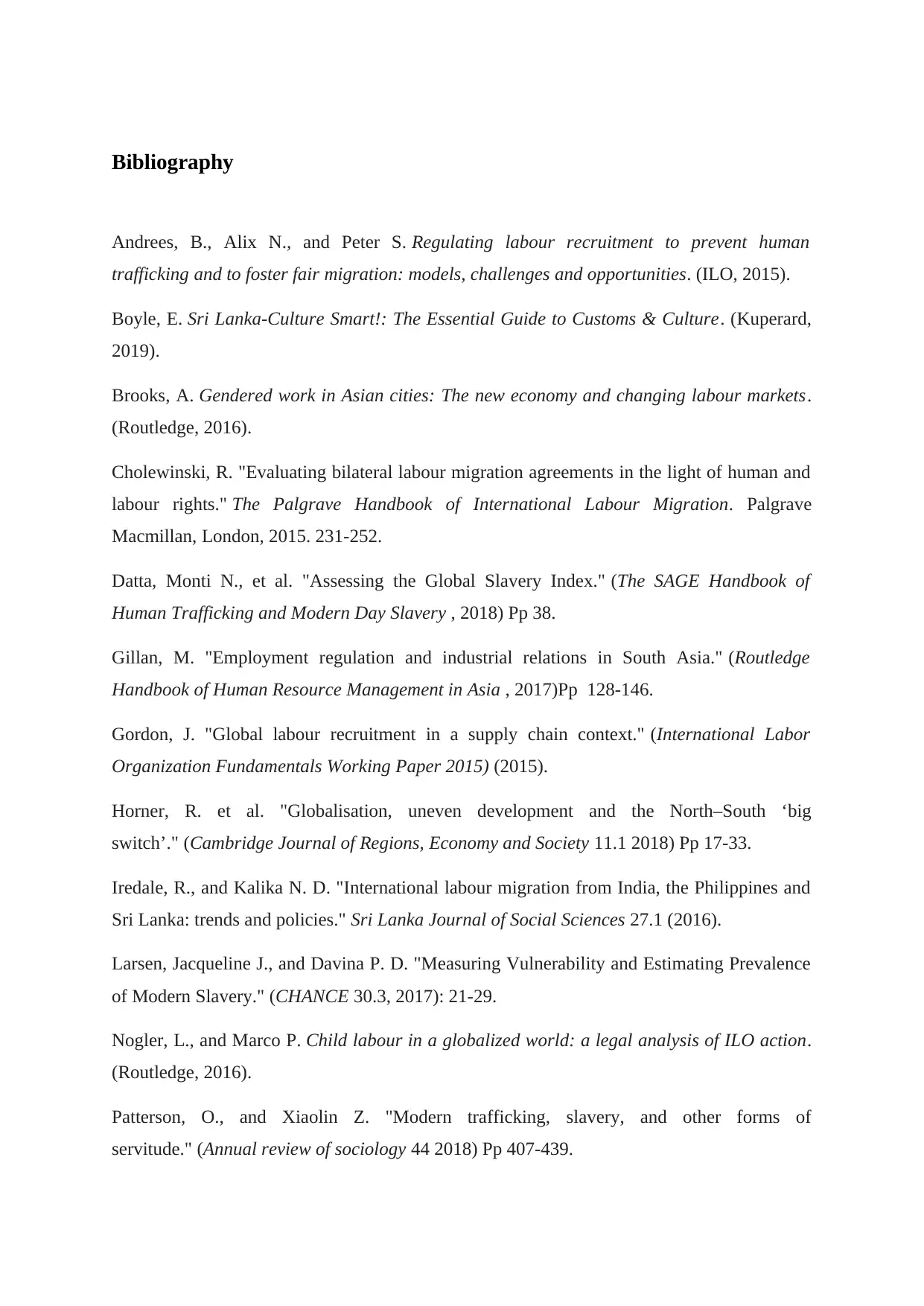
Bibliography
Andrees, B., Alix N., and Peter S. Regulating labour recruitment to prevent human
trafficking and to foster fair migration: models, challenges and opportunities. (ILO, 2015).
Boyle, E. Sri Lanka-Culture Smart!: The Essential Guide to Customs & Culture. (Kuperard,
2019).
Brooks, A. Gendered work in Asian cities: The new economy and changing labour markets.
(Routledge, 2016).
Cholewinski, R. "Evaluating bilateral labour migration agreements in the light of human and
labour rights." The Palgrave Handbook of International Labour Migration. Palgrave
Macmillan, London, 2015. 231-252.
Datta, Monti N., et al. "Assessing the Global Slavery Index." (The SAGE Handbook of
Human Trafficking and Modern Day Slavery , 2018) Pp 38.
Gillan, M. "Employment regulation and industrial relations in South Asia." (Routledge
Handbook of Human Resource Management in Asia , 2017)Pp 128-146.
Gordon, J. "Global labour recruitment in a supply chain context." (International Labor
Organization Fundamentals Working Paper 2015) (2015).
Horner, R. et al. "Globalisation, uneven development and the North–South ‘big
switch’." (Cambridge Journal of Regions, Economy and Society 11.1 2018) Pp 17-33.
Iredale, R., and Kalika N. D. "International labour migration from India, the Philippines and
Sri Lanka: trends and policies." Sri Lanka Journal of Social Sciences 27.1 (2016).
Larsen, Jacqueline J., and Davina P. D. "Measuring Vulnerability and Estimating Prevalence
of Modern Slavery." (CHANCE 30.3, 2017): 21-29.
Nogler, L., and Marco P. Child labour in a globalized world: a legal analysis of ILO action.
(Routledge, 2016).
Patterson, O., and Xiaolin Z. "Modern trafficking, slavery, and other forms of
servitude." (Annual review of sociology 44 2018) Pp 407-439.
Andrees, B., Alix N., and Peter S. Regulating labour recruitment to prevent human
trafficking and to foster fair migration: models, challenges and opportunities. (ILO, 2015).
Boyle, E. Sri Lanka-Culture Smart!: The Essential Guide to Customs & Culture. (Kuperard,
2019).
Brooks, A. Gendered work in Asian cities: The new economy and changing labour markets.
(Routledge, 2016).
Cholewinski, R. "Evaluating bilateral labour migration agreements in the light of human and
labour rights." The Palgrave Handbook of International Labour Migration. Palgrave
Macmillan, London, 2015. 231-252.
Datta, Monti N., et al. "Assessing the Global Slavery Index." (The SAGE Handbook of
Human Trafficking and Modern Day Slavery , 2018) Pp 38.
Gillan, M. "Employment regulation and industrial relations in South Asia." (Routledge
Handbook of Human Resource Management in Asia , 2017)Pp 128-146.
Gordon, J. "Global labour recruitment in a supply chain context." (International Labor
Organization Fundamentals Working Paper 2015) (2015).
Horner, R. et al. "Globalisation, uneven development and the North–South ‘big
switch’." (Cambridge Journal of Regions, Economy and Society 11.1 2018) Pp 17-33.
Iredale, R., and Kalika N. D. "International labour migration from India, the Philippines and
Sri Lanka: trends and policies." Sri Lanka Journal of Social Sciences 27.1 (2016).
Larsen, Jacqueline J., and Davina P. D. "Measuring Vulnerability and Estimating Prevalence
of Modern Slavery." (CHANCE 30.3, 2017): 21-29.
Nogler, L., and Marco P. Child labour in a globalized world: a legal analysis of ILO action.
(Routledge, 2016).
Patterson, O., and Xiaolin Z. "Modern trafficking, slavery, and other forms of
servitude." (Annual review of sociology 44 2018) Pp 407-439.
⊘ This is a preview!⊘
Do you want full access?
Subscribe today to unlock all pages.

Trusted by 1+ million students worldwide
1 out of 13
Related Documents
Your All-in-One AI-Powered Toolkit for Academic Success.
+13062052269
info@desklib.com
Available 24*7 on WhatsApp / Email
![[object Object]](/_next/static/media/star-bottom.7253800d.svg)
Unlock your academic potential
Copyright © 2020–2026 A2Z Services. All Rights Reserved. Developed and managed by ZUCOL.



